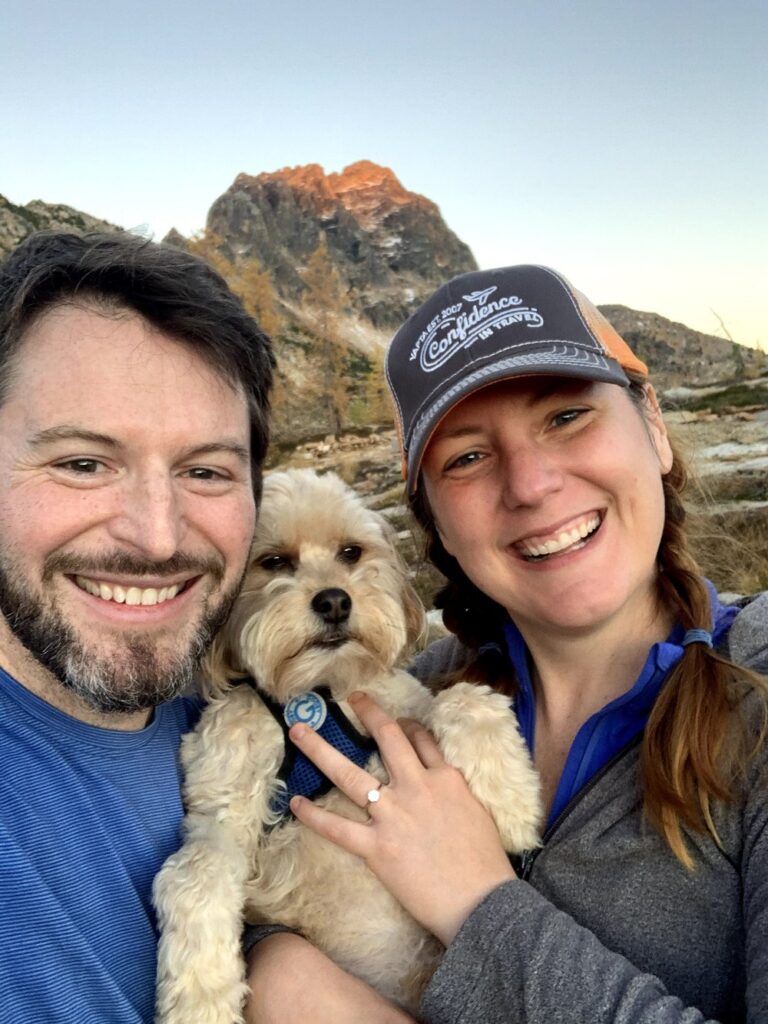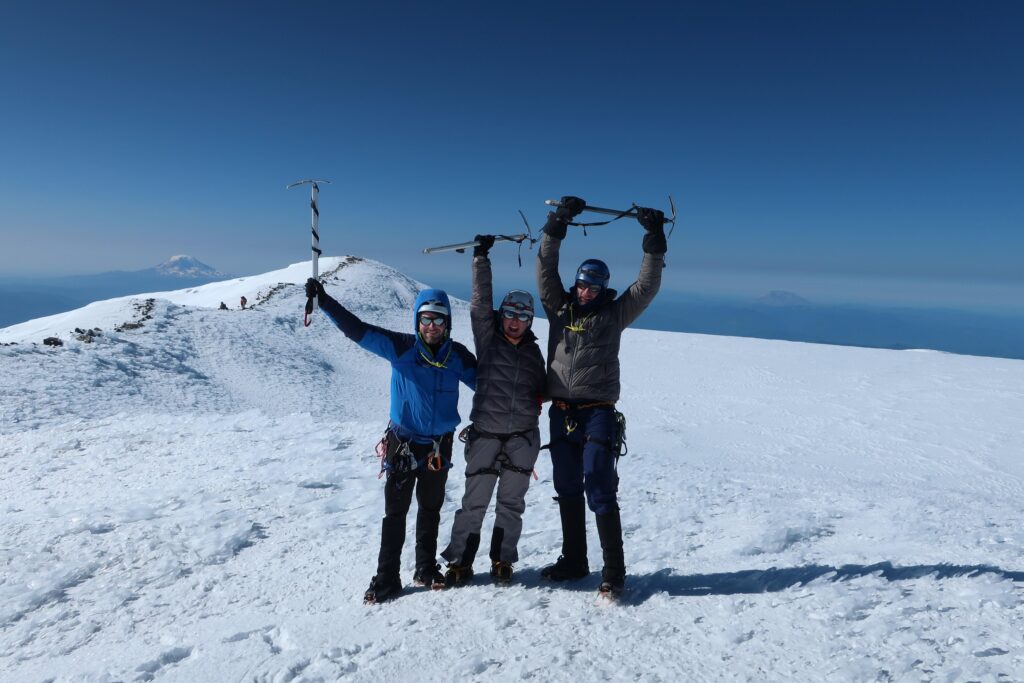Satellite CTO and Cofounder Chuck Smith lives, breathes, and builds community. Not only does he bring quiet warmth and endless support to the community as a member at Vibe Coworks—Chuck brings that same spirit of collaboration and working better together to everything he does, from tackling audacious outdoor adventures to creating a company designed to build community and support new tech sales professionals throughout their careers.
Perhaps most impressive of all, Chuck has managed to build, foster, and maintain this strong sense of community and collaboration throughout a pandemic and with an entirely remote company and service.
We sat down with Chuck to learn more about the community-based company he’s helped build and what motivates him to keep doing the work.

Chuck, wife + cake maker extraordinaire Hilary, and their dog Benny enjoying the great outdoors together.
Tell us a bit about yourself.
Chuck: I’m a technology executive and startup veteran who has spent the last 20+ years developing software applications, leading teams, and building companies.
I particularly love solving challenges involving data science, machine learning / artificial intelligence, and scaling up. I live in Poulsbo with my wife, Hilary, and our two favorite creatures (Benny the dog and Schatzi the cat). In our spare time, we love getting out for hiking, backpacking, travel, and all things food. I’m on a long-term geographic quest to reach the highest point in all 50 states (20 done so far).

Chuck, Hilary, and Hilary’s brother enjoy a well-earned celebration at the summit of Washington’s very own, Mount Rainier!
What about the company you co-founded, Satellite, can you tell us about it?
Chuck: Satellite is built on the belief that talent is distributed evenly across the US, but opportunity is not. Jobs in the rapidly growing tech sector have historically been concentrated in hubs such as the San Francisco Bay Area, Seattle, Austin, and New York.
At the same time, the pandemic is a pivotal point where all companies have had to reckon with going remote and what the future of work looks like for them. Sales is particularly challenging, as there is nothing quite like the energy of the sales floor.
Satellite fits in this niche of helping these forward-thinking companies create high-performing sales teams and adopt a successful remote strategy. And we help individuals in cities across the US transform their lives by transitioning into a lucrative career that they will love.
In short: Satellite is a decentralized workforce training and placement program that connects talented professionals in up-and-coming US cities to remote roles in modern technology sales organizations.
“I particularly love solving challenges involving data science, machine learning / artificial intelligence, and scaling up… Satellite is built on the belief that talent is distributed evenly across the US, but opportunity is not.”
You and your co-founder, Chris Waldron, chose a model that makes your program free to students, and you also reward students for referrals. Why did you make these choices or feel this approach was important?
Chuck: We wanted to build a program that is accessible to all talented individuals, regardless of their location and financial means. We wanted Satellite’s incentives to align with the students’, so we only earn money when the student successfully lands their new job. This is a big difference when compared to tech sales boot camps that charge tuition or establish income share agreements (ISAs) with their students to cover costs.
Satellite has a network of hiring partners that are carefully selected. What goes into determining if a company is a good fit or not?
Chuck: Satellite looks for hiring partners that are just as committed to our graduates’ growth and development as we have been. To thrive long-term in a tech sales career they will need ongoing mentorship and coaching, so we select companies that have the right leadership and mindset in place to provide this.
How has coworking, including your time at Vibe, impacted your work with Satellite?
Chuck: Satellite is 100% remote, with our full-time team spread across three US states and Nigeria. As such, I’ve needed reliable internet and quiet spaces for all those Zoom calls and working from Vibe has certainly delivered on that front. Vibe also has helped me maintain a healthy routine of having a place to go during the past couple of pandemic years.
“I needed reliable internet and quiet space for Zoom calls. Vibe also has helped me maintain a healthy routine of having a place to go during the past couple of pandemic years.”
What’s your favorite part of the work you do?
Chuck: My favorite part of what we’re accomplishing with Satellite is the impact we are having on individuals going through the program. We’re literally changing lives for people and their families. We’ve had amazing and talented people who were without a permanent residence or engaged in manual labor jobs launch a career thanks to our program, and are now making $80K+ a year.
Co-founder relationships can be tricky. How did you and Chris form yours and how do you maintain the balance?
Chuck: Chris and I had actually worked closely together for several years previously at TakeLessons. This prior experience has been a huge help in our Satellite co-founder relationship because we already had this strong foundation of trust and knew each other’s working style. We understand each other’s strengths and limitations and complement each other well.
One key for maintaining the relationship is our weekly meetings where we don’t just discuss important company issues but also share openly about our feelings – joys, fears, etc.
What is one piece of advice you’d offer to other founders working to launch a start-up?
Chuck: You need to be great at solving the problems that matter most to move your business forward. In an early-stage startup, you’ll be pulled in many different directions and forced to wear many hats. So you need first to identify what needs to be solved and then focus your energy on that to make the biggest impact.
What’s next for Satellite? Do you have any upcoming initiatives or projects you’d like to share?
Chuck: Having wrapped up our first full year of operations in 2021, we are hitting the gas in 2022 to expand rapidly the reach and impact of our program. We’re starting to run more frequent training programs (every four weeks instead of every eight) to better meet the needs of both participants who are excited to start their new career and the companies who want to grow their teams. We’ve also started to see participants that we placed last year get promoted within their company, so we’re thinking about how to provide long-term career support to them.
